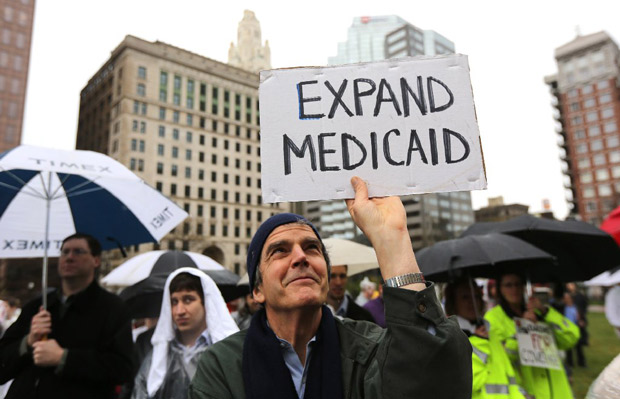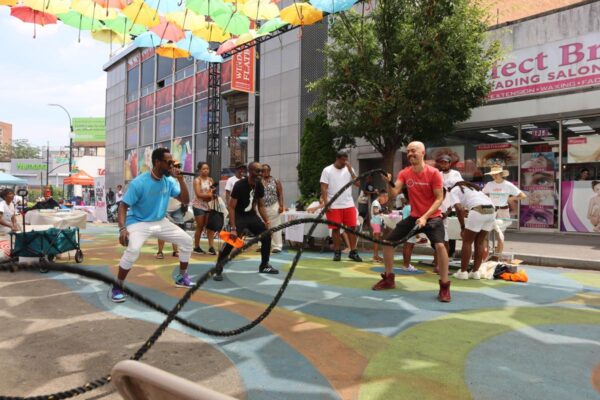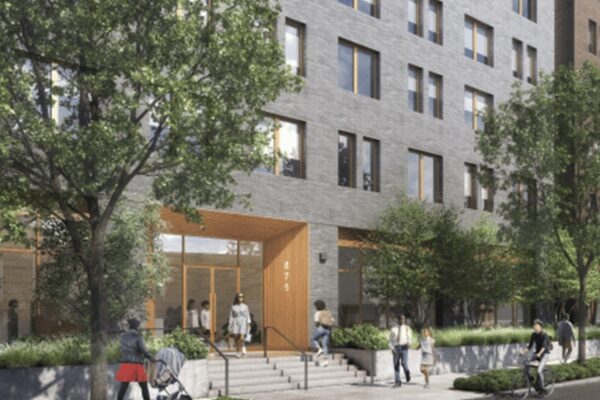While President Trump and the Republicans in Congress try to figure out another way to thrash Medicaid, a coalition of community groups, labor organizations and community members held a “Town Hall” detailing how this affects Americans, what we can expect, and how to fight against it.
The Coalition to Protect Medicaid, a coalition of 22 community-based organizations coordinated by the Commission on the Public’s Health System, outlined winners and losers in the Republicans’ plan to repeal the Affordable Care Act. It’s clear: the losers would be Americans from coast to coast.
One third of New Yorkers – 6.5 million of our people – get their health care through Medicaid – for their doctor or hospital, home care, nursing home care, and more.
Medicaid funds community hospitals, health centers, and other providers that take care of all of us. Millions are in danger of losing their health insurance and access to health care if the proposed legislative Medicaid changes are enacted.
The Congressional proposal, which did not get a vote, would have been extremely harmful to low-income residents, safety-net health care providers, and the economy overall as residents lose their health care coverage and their livelihoods.
Community residents, community-based organizations, labor, and state and city elected officials came together with a common purpose – the need to protect Medicaid, and plan to defeat the Republican proposals for eliminating ‘Obamacare’, throwing us onto the “mercy” of the insurance industry.
“Medicaid is truly a lifeline for millions of New Yorkers who otherwise cannot afford basic health care,” said Public Advocate Letitia James. “There is no question that this federal administration’s threats to Medicaid would have devastating implications not just to our most vulnerable populations, but also to our safety-net health care providers. We must continue to fight any attempt to repeal Medicaid or any plan that puts our communities and our City at danger.”
“As patient advocates, we stand with many others for the protection of Medicaid funding in New York,” said Jill Furillo, RN, Executive Director, New York State Nurses Association. “Millions of patients and families rely upon these funds as their lifeline to essential care. Nurses are staunchly opposed to cuts that have been proposed in recent weeks on the federal level. We believe these efforts undercut the public’s health in the most fundamental ways– maternal care, child care, the elderly, disabled and more.”
“It is frankly appalling that the current administration and Congress have embarked on a crusade to significantly roll back Medicaid jeopardizing the healthcare of our most vulnerable communities,” said State Senator Gustavo Rivera. “I commend the efforts of the Coalition to Protect Medicaid for putting together this important forum and, as the Ranking Member of the Senate Health Committee, I vow to continue fighting against any federal Medicaid cuts, while fighting to implement a single payer health delivery system in New York State to ensure health care for all our residents.”
“Republicans in Washington failed in their first attempt to gut Medicaid, but they’ll be back for another round,” said Assembly Health Committee Chair Richard N. Gottfried. “Medicaid provides health care for one third of New Yorkers, including frail and elderly patients in nursing homes and home care, and funding for essential safety-net healthcare providers. Targeting these individuals and providers is mean- spirited and fiscally irresponsible, and New York must do everything we can as a State to resist Federal attacks on the program.”
“In order to give even more tax breaks to the super-wealthy; in order to allow insurance companies to rake-in even more profits, Trump and the Republicans are prepared to jeopardize the health and wellness of people of low and moderate income, communities of color, immigrants and other communities with already limited access to excellent quality health care,” said Anthony Feliciano, Director of the Commission on the Public’s Health System.
Latisha Gibbs, a community health educator and mother of six children who are covered by Medicaid, also shared her worries about the Medicaid changes and how she will be able to find care in the Bronx where she lives.
“There are already long waits for appointments in basic health care services. How can you make this worse?” said Latisha Gibbs.
“Many people with chronic conditions, especially people living with HIV/AIDS, rely on Medicaid for healthcare,” said Charles King, President and CEO, Housing Works. “Governor Cuomo is committed to ending AIDS as an epidemic in New York by the year 2020, but any cut or fundamental change to Medicaid would severely harm that effort. In fact, all of the progress we’ve made in the last 35 years would be at serious risk.”
“At Planned Parenthood of New York City, we see firsthand how important it is that all people are able to access the health care they need,” said Joan Malin, President and CEO, Planned Parenthood of New York City. “Medicaid is a crucial part of that. More than half of our patients rely on Medicaid for access to health care. The attempts by the current administration to repeal the Affordable Care Act and slash Medicaid would disproportionately hurt low-income women and people of color—people who already face other barriers to accessing care. We will not stop fighting for our communities, and will speak out against any attempt to cut people off from health care, no matter what.”
“Current efforts to destroy the Medicaid program and undermine the health care safety net are a direct threat to immigrant New Yorkers,” said New York Immigration Coalition Executive Director Steven Choi. “As the anti-immigrant rhetoric and policies of the Trump Administration sow fear and anxiety, we especially need to support the systems and providers that serve the most vulnerable New Yorkers. This is our New York.”
“Medicaid serves as a lifeline for many New Yorkers – including our clients – to necessary medical care,” said Rebecca Novick, Director of the Health Law Unit at The Legal Aid Society. “The proposals currently being floated from the White House and Congress would prove disastrous for low-income individuals, the disabled, elderly, working families and communities of color. We stand shoulder-to- shoulder with our clients and others around the city united against these regressive cuts.”
“Of particular importance to us are the so-called ‘optional’ Medicaid services – prescription drugs, dental services, durable medical equipment like wheelchairs, home care, and rehabilitation services like physical therapy, occupational therapy, and speech therapy. New York State would look to cut these services if federal funding for Medicaid is reduced,” said Liliete Lopez of Center for Independence of the Disabled New York.
“Medicaid is one of the most important programs for the health of New York’s seniors and families. We must ensure that it remains a well-funded and effective program for our most vulnerable populations as well as for the community at large,” said Maria Alvarez, Executive Director, NY StateWide Senior Action Council.
The “Town Hall” was sponsored by the Coalition to Protect Medicaid, with co-sponsors including:
- Academy of Medical and Public Health Services
- African Services Committee
- Arab American Family Support Center
- Assembly Member Dick Gottfried
- Brooklyn Perinatal Network, Inc.
- Brooklyn-wide Interagency Council of the Aging
- Caribbean Women’s Health Association
- Center for Independence of the Disabled NY
- Commission on the Public’s Health System
- Council Member Corey Johnson
- El Centro del Inmigrante
- Fort Greene SNAP
- Harlem Independent Living Center
- Harvest Home Farmers Market
- Health People
- Housing Works
- Korean Community Services of Metropolitan New York
- The Legal Aid Society
- New York Immigration Coalition
- New York State Nurses Association
- NY Legal Assistance Group
- NY StateWide Senior Action Council
- Northern Manhattan Perinatal Partnership CARES
- Planned Parenthood NYC
- Public Advocate Letitia James
- State Senator Gustavo Rivera
- State Senator Liz Krueger
- South Asian Council for Social Services
SOURCE The Coalition to Protect Medicaid





















